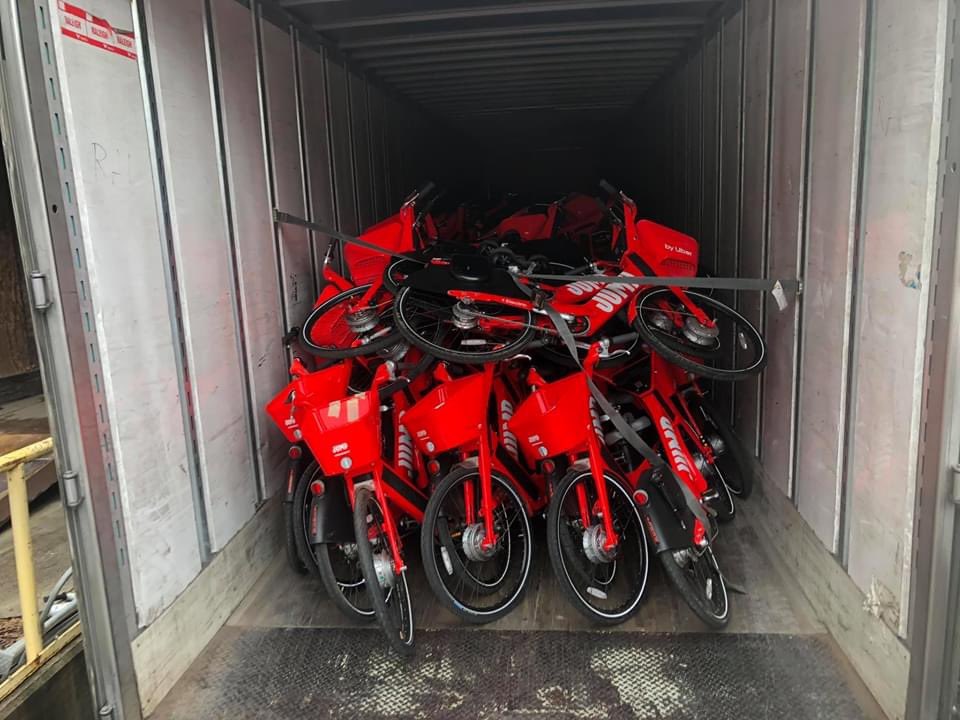Over the last few weeks, thousands of perfectly good JUMP electric bikes and scooters have been dropped off at a recycling facility and will be shredded, Motherboard has learned. The untimely end of these micromobility devices comes at a particularly absurd time, with the nation facing a widespread bike shortage because of surging demand for safe, affordable urban transportation during the pandemic.
JUMP, a bike-and-scooter share startup sold to Uber in 2018, operates in 37 cities around the world, including 18 in the U.S., according to the company’s website. Under pressure to pursue profitability, Uber dumped JUMP onto Lime, another micromobility company with operations in 114 cities around the world, in a complicated deal earlier this month that resulted in Uber taking a larger share in Lime. The fate of JUMP and its distinctive red bikes and scooters was unclear until the videos of the crushers began to surface.
The photos and videos of the JUMP bike heaps posted to social media sites have disappointed former JUMP employees, bike and scooter advocates, and people who don't like to see useless waste. The micromobility industry is now practicing the exact kind of wastefulness shared sustainable transportation is supposed to counteract.
“Even if there isn’t a city government with the chops to convert unwanted Jumps into a new/used e-bike share system, why not at least peel the decals off and sell the bikes to individuals?” asked Jon Orcutt of the non-profit group Bike New York. He added that JUMP bikes have a reputation for being “really well-made and purpose-built for city transportation,” unlike the cheap dockless bikes from companies like MoBike and Ofo that ended up in mass graveyards. Likewise, Skip Scooters co-founder and CEO Sanjay Dastoor said the videos were tough to watch and called the JUMP bikes “the best shared e-bikes ever designed.”
David Zipper, a Visiting Fellow at the Harvard Kennedy School’s Taubman Center for State and Local Government who studies the micromobility industry said that given the shortage, the videos are “so jarring, and so troubling.”
A former JUMP employee, who asked to remain anonymous because they signed a non-disclosure agreement, said watching the videos stung them personally.
“Part of my personal pride in working for JUMP was witnessing first hand the impacts these bikes had on communities," they said. "And with COVID-19, the fleet of bikes that is being destroyed could've done even more good for cities. We're in the midst of a bike boom where more people are biking than ever. We're in the midst of an e-bike shortage induced by the Chinese trade war and tens of thousands of e-bikes are getting sold for scrap.”
Are you a former JUMP employee? What do you think of the bikes and scooters being destroyed? Email aaron.gordon@vice.com or aaronwgordon@protonmail.com.
A man who answered the phone at the Durham, North Carolina location of Foss Recycling confirmed they’ve received “about 18 trailers” filled with scooters and bikes over the last week—another source at the same location put the number of trailers closer to 30—and that after their batteries and electronics are removed they’re “going to be recycled.” He declined to give his name to Motherboard and, when asked why, replied “I don’t know where it’s going.”

Why exactly these functional bikes and scooters are being destroyed even when demand for them is at a peak requires diving into the confusing world of four-letter micromobility companies. JUMP was acquired by Uber in 2018 as a diversification effort prior to going public to signal to investors it was well-positioned for whatever transportation trends may emerge over time. But it was always an awkward fit, and a money-losing one to boot. The recent sale to Lime put JUMP’s fate in question.
As for which company is responsible for selling off the bikes and scooters for scrap, Lime says it wasn’t them. “As part of the JUMP acquisition, we took possession of tens of thousands of e-bikes—including the spare parts and tools to fix them—and have already begun to deploy them,” a Lime spokesperson told Motherboard. “We have not recycled any of the JUMP e-bikes in our fleet and are committed to scaling and operating them during this critical time.” The spokesperson added that when the transaction officially closes, Lime plans to work with Uber to “find sustainable ways to donate and re-use any remaining e-bikes in their inventory.”
An Uber spokesperson said the company kept the older models. "We explored donating the remaining, older-model bikes, but given many significant issues—including maintenance, liability, safety concerns, and a lack of consumer-grade charging equipment—we decided the best approach was to responsibly recycle them."
The man at Foss Recycling told Motherboard their contract is not with either Uber or Lime, but with a company called Blue Sky Trading, which is removing and keeping the electronic and battery components. After that, the man said the bikes and scooters will “be shredded through the auto shredder, and the metal will be distributed out from there.”
The mass bike and scooter destruction, especially when demand for biking is at such a height, is yet another piece of evidence that the well-intentioned goals of micromobility workers who believed they were working to promote sustainable transportation does not ultimately align with the goals of the companies they worked for. Last month, Bird laid off more than 400 employees, some of whom openly questioned whether the company could ever achieve the grand vision it sold to investors.
For his part, the former JUMP employee sees this as yet another lost opportunity. “An amazing COVID e-bike program could've done so much good and instead we have horrific images of bikes being eaten by the Claw at the dump. It's a shameful nightmare.”
from VICE https://ift.tt/3d3ObTM
via cheap web hosting
No comments:
Post a Comment